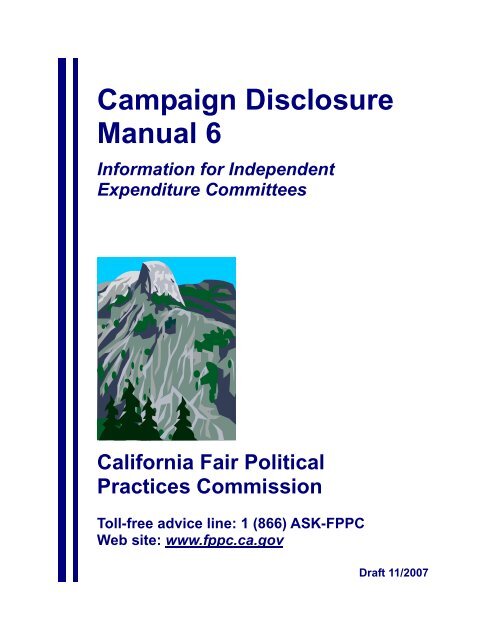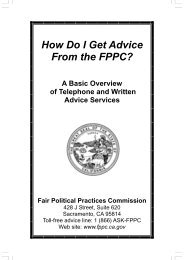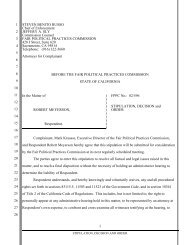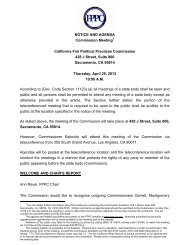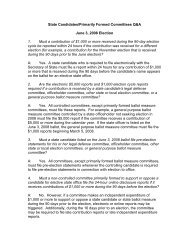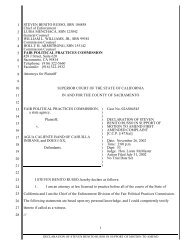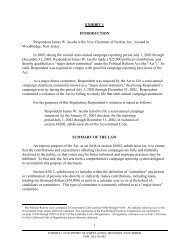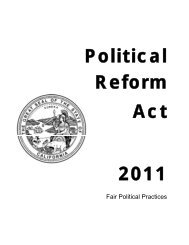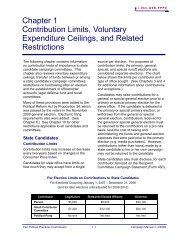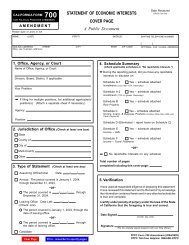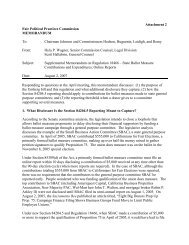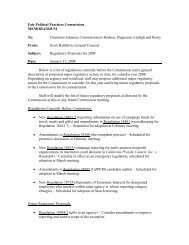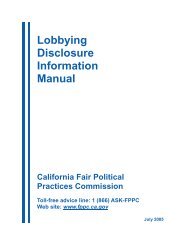Independent Expenditures - Fair Political Practices Commission ...
Independent Expenditures - Fair Political Practices Commission ...
Independent Expenditures - Fair Political Practices Commission ...
You also want an ePaper? Increase the reach of your titles
YUMPU automatically turns print PDFs into web optimized ePapers that Google loves.
Campaign Disclosure<br />
Manual 6<br />
Information for <strong>Independent</strong><br />
Expenditure Committees<br />
California <strong>Fair</strong> <strong>Political</strong><br />
<strong>Practices</strong> <strong>Commission</strong><br />
Toll-free advice line: 1 (866) ASK-FPPC<br />
Web site: www.fppc.ca.gov<br />
Draft 11/2007
Contents<br />
Contents<br />
Introduction Intro-1<br />
Chapter 1—Committee Qualification and<br />
Identification Rules 1-1<br />
Chapter 2—Reporting Requirements 2-1<br />
Appendix—About the <strong>Political</strong> Reform Act/How to Get Help Appendix-1<br />
<strong>Fair</strong> <strong>Political</strong> <strong>Practices</strong> <strong>Commission</strong> Contents-1 <strong>Independent</strong> Expenditure Manual,<br />
draft 11/2007
Introduction<br />
This manual provides important information<br />
on campaign disclosure rules for<br />
independent expenditure committees.<br />
How to Use this Manual<br />
California’s <strong>Political</strong> Reform Act (the “Act”)<br />
requires receipts and expenditures in<br />
election campaigns to be disclosed fully and<br />
truthfully. Since 1974, there have been over<br />
200 amendments to the Act’s campaign<br />
disclosure provisions. This manual has been<br />
prepared to assist independent expenditure<br />
committees to comply with the Act’s<br />
numerous and often detailed rules. This<br />
manual is written in a “user friendly” format<br />
so that committees have a resource guide.<br />
Also provided is a list of statutes and<br />
regulations at the end of each chapter.<br />
These can be accessed on the FPPC<br />
website under the Library and Publications<br />
section.<br />
In addition, federal and state tax laws and<br />
other rules may be applicable. Telephone<br />
numbers and website addresses for the<br />
Federal Election <strong>Commission</strong>, Internal<br />
Revenue Service, California Franchise Tax<br />
Board, and the Federal Communications<br />
<strong>Commission</strong> are listed in the Appendix.<br />
Controlling Law<br />
This manual summarizes key campaign<br />
disclosure laws and regulations and draws<br />
from years of FPPC staff advice on<br />
complying with the provisions of the Act’s<br />
campaign disclosure laws. Each<br />
committee’s activity is different, however,<br />
and may raise issues not discussed in this<br />
manual. If there are any discrepancies<br />
between the manual and the Act or its<br />
corresponding regulations, the Act and its<br />
regulations will control.<br />
1-866-ASK-FPPC<br />
Introduction<br />
Need Help?<br />
If you need assistance, the <strong>Fair</strong> <strong>Political</strong><br />
<strong>Practices</strong> <strong>Commission</strong> has a toll-free advice<br />
line:<br />
1-866-ASK FPPC<br />
(1-866-275-3772)<br />
FPPC employees are available Monday<br />
through Friday to help you. In addition, the<br />
FPPC website (www.fppc.ca.gov) contains<br />
forms, manuals, and a wealth of other helpful<br />
information.<br />
Don’t forget these rules…<br />
• An independent expenditure is made on<br />
the date the communication is mailed,<br />
delivered, broadcast or otherwise<br />
disseminated to the public.<br />
• Each independent expenditure of $1,000<br />
or more on behalf of a candidate or ballot<br />
measure triggers the filing of both Form<br />
465 and Form 461.<br />
• Filing locations for Form 465 and Form<br />
496 are sometimes different than where<br />
the independent expenditure committee<br />
files the Form 461.<br />
• Check the election calendar at<br />
www.fppc.ca.gov for deadlines for filing<br />
Form 496; it depends on the type of<br />
candidate or measure supported or<br />
opposed as well as the committee’s status<br />
as a state electronic filer.<br />
• <strong>Independent</strong> expenditure committees<br />
terminate automatically at then end of<br />
each calendar year. Activity from one<br />
calendar year does not trigger filing in<br />
another calendar year.<br />
• Contributions to state or local candidates<br />
and committees may also trigger reports.<br />
• If the committee receives contributions<br />
totaling $1,000 or more in a calendar year,<br />
refer to the manuals for primarily formed<br />
committees or general purpose<br />
committees, rather than this manual.<br />
<strong>Fair</strong> <strong>Political</strong> <strong>Practices</strong> <strong>Commission</strong> Intro-1 <strong>Independent</strong> Expenditure Committee Manual,<br />
draft 11/2007
Chapter 1<br />
Committee Qualification and<br />
Identification Rules<br />
What is an <strong>Independent</strong><br />
Expenditure Committee?<br />
An independent expenditure committee is an<br />
individual or entity (e.g., corporation, firm,<br />
business, or proprietorship) that makes one<br />
or more independent expenditures totaling<br />
$1,000 or more in a calendar year to support<br />
or oppose state or local candidates or ballot<br />
measures. An independent expenditure<br />
committee does not receive contributions for<br />
the purpose of making expenditures<br />
supporting or opposing California candidates<br />
or ballot measures.<br />
An individual or entity will qualify as an<br />
independent expenditure committee if $1,000<br />
or more in independent expenditures are<br />
made in a calendar year. In addition, the<br />
committee must report any contributions it<br />
makes to state or local candidates or<br />
committees.<br />
QuickTIP<br />
If contributions totaling $1,000 or<br />
more are received in a calendar year<br />
for the purpose of making contributions or<br />
independent expenditures in connection with<br />
California candidates or ballot measures,<br />
refer to the FPPC campaign manuals for<br />
“primarily formed recipient committees” or<br />
“general purpose recipient committees.”<br />
When two or more individuals or entities<br />
make separate payments totaling $1,000 or<br />
more for a single communication, they also<br />
may qualify as a recipient committee.<br />
1-866-ASK-FPPC<br />
Multi-Purpose Organizations<br />
(Including Nonprofit Organizations,<br />
and Federal and Out-of-State <strong>Political</strong><br />
Action Committees)<br />
Some organizations that receive donations or<br />
other payments (e.g., membership dues) for<br />
purposes other than making political<br />
expenditures in California nevertheless do, at<br />
times, make political expenditures to support<br />
or oppose California state or local candidates<br />
or ballot measures. These organizations<br />
may be subject to filing campaign statements<br />
in California.<br />
A multi-purpose organization is receiving<br />
“contributions” if its members or donors make<br />
payments to the organization (including<br />
dues) and, at the time of making the<br />
payments, the donors know or have reason<br />
to know that the funds with which their<br />
payments will be commingled will be used to<br />
make contributions or expenditures to<br />
support or oppose California state or local<br />
candidates or ballot measures.<br />
There is a presumption that the donors do<br />
not have reason to know that all or part of<br />
their payments made to the mulit-purpose<br />
organization will be used for political<br />
activities in California unless the<br />
organization has made expenditures or<br />
contributions totaling at least $1,000 during<br />
the current calendar year or any of the<br />
immediately preceding four calendar years.<br />
A multi-purpose organization may become<br />
an independent expenditure committee if it<br />
makes one independent expenditure of<br />
$1,000 or more to influence a state or local<br />
election and the organization has not made<br />
expenditures or contributions totaling at least<br />
$1,000 in the current and past four years.<br />
<strong>Fair</strong> <strong>Political</strong> <strong>Practices</strong> <strong>Commission</strong> 1-1 <strong>Independent</strong> Expenditure Committee Manual,<br />
draft 11/2007
Chapter 1 — Committee Qualification and Identification Rules<br />
If the multi-purpose organization makes<br />
another independent expenditure of $1,000<br />
or more (except as noted below) the<br />
organization will be required to file as a<br />
recipient committee.<br />
501(c)(4) Organizations<br />
On December 13, 2007, the <strong>Fair</strong> <strong>Political</strong><br />
<strong>Practices</strong> <strong>Commission</strong> adopted an<br />
emergency regulation that provides a<br />
reporting option for certain or eligible multipurpose<br />
organizations operating under<br />
Section 501(c)(4) of the Internal Revenue<br />
Code. The regulation specifies that a multipurpose<br />
organization may elect not to file<br />
statements as a recipient committee if the<br />
organization makes independent<br />
expenditures from general treasury funds in<br />
connection with a ballot measure(s) in<br />
California and the total amount of<br />
independent expenditures spent is below the<br />
stated amount in the regulation. The<br />
organization must report these independent<br />
expenditures and the donors of funds used to<br />
make the independent expenditures on Form<br />
496. Regulation 18413 is available on the<br />
FPPC’s website. A permanent regulation is<br />
scheduled for consideration in March 2008.<br />
What is an <strong>Independent</strong> Expenditure?<br />
“<strong>Independent</strong> Expenditure” is a payment for a<br />
communication that expressly advocates the<br />
election or defeat of a clearly identified<br />
candidate or the qualification, passage, or<br />
defeat of a clearly identified ballot measure,<br />
and the communication is not made at the<br />
behest of the affected candidate or<br />
committee. An independent expenditure is<br />
made when a communication is mailed,<br />
broadcast, or otherwise disseminated to the<br />
public.<br />
Examples In May, Sandra Farmer paid<br />
$4,000 for a mailing that included<br />
the statement “Vote No on Measure A.”<br />
Sandra, acting on her own, paid for the<br />
mailing with her personal funds and qualified<br />
as an independent expenditure committee.<br />
In October, MBI Development Corporation<br />
paid for a series of automated telephone<br />
calls to voters in Southern California that<br />
urged voters to vote for a statewide candidate.<br />
The corporation, acting independently of the<br />
candidate’s committee, paid $12,000 for the<br />
calls. The corporation qualified as an<br />
independent expenditure committee.<br />
What is a Contribution?<br />
A “contribution” is a monetary or<br />
nonmonetary payment made to or at the<br />
behest of a candidate or committee for which<br />
the committee has not provided full and<br />
adequate consideration in return. A<br />
contribution may take any of the following<br />
forms:<br />
• Money (cash, check, credit card, wire<br />
transfers);<br />
• Loans (including loan guarantees, cosigning,<br />
lines of credit, and the<br />
forgiveness of a loan);<br />
• Enforceable promises;<br />
• Tickets to political fundraisers (full value of<br />
the ticket); and<br />
• Nonmonetary items (donated goods or<br />
services).<br />
QuickTIP<br />
Whether a payment for a<br />
communication is deemed to be<br />
express advocacy and whether the<br />
communication is made at the behest of the<br />
affected candidate or measure committee,<br />
are factual determinations based on the text<br />
of the communication and the circumstances<br />
associated with it. Persons can call the<br />
FPPC for guidance.<br />
Affiliated and Non-Affiliated<br />
Committees<br />
There are certain situations when payments<br />
made by two or more persons are<br />
<strong>Fair</strong> <strong>Political</strong> <strong>Practices</strong> <strong>Commission</strong> 1-2 <strong>Independent</strong> Expenditure Committee Manual,<br />
draft 11/2007
aggregated and the persons are treated as a<br />
single committee for reporting purposes.<br />
Under the Act, the term “person” includes an<br />
individual, proprietorship, firm, partnership,<br />
joint venture, syndicate, business trust,<br />
company, corporation, limited liability<br />
company, committee, and association.<br />
Affiliated individuals and entities will qualify<br />
as a single committee, if, together, their<br />
independent expenditures total $1,000 or<br />
more, in a calendar year.<br />
The following payments are aggregated:<br />
• Contributions or independent expenditures<br />
made from an individual’s personal funds<br />
and from funds he or she directs and<br />
controls.<br />
• Contributions or independent expenditures<br />
made by two or more entities that are<br />
directed and controlled by a majority of the<br />
same persons.<br />
• Contributions or independent expenditures<br />
made by entities that are majority owned by<br />
any person. Contributions and independent<br />
expenditures made by the majority owner<br />
and all other entities majority owned by that<br />
person are aggregated unless the entities<br />
act independently in their decisions to make<br />
contributions or independent expenditures.<br />
The following are basic examples to provide<br />
general guidance. Every case is unique and<br />
we encourage you to contact us for advice.<br />
Examples<br />
In May, Ellen Gomez attended a<br />
fundraiser for a candidate and<br />
used her personal funds to pay for the $500<br />
ticket. In June, she made a $3,000<br />
independent expenditure from her wholly<br />
owned business to oppose a ballot measure<br />
and qualified as an independent expenditure<br />
committee. Because Ms. Gomez directed<br />
and controlled all of the payments, she and<br />
her business qualify as a single committee<br />
and must disclose her personal contributions<br />
Chapter 1 — Committee Qualification and Identification Rules<br />
as well as the independent expenditures<br />
made from her business.<br />
Pace Computers contributed a total of<br />
$9,000 to support various legislative<br />
candidates. Under the direction of Pace<br />
Computers, Global Software, Inc., a<br />
company in which Pace Computers has a<br />
greater than 50 percent ownership interest,<br />
made an independent expenditure of $7,000<br />
to support a local candidate. Because<br />
Global Software, Inc. did not act<br />
independently, the companies qualify as a<br />
single committee and will file a single Form<br />
461 listing both contributions and<br />
independent expenditures.<br />
Southwest Telecom has a greater than 50<br />
percent ownership interest in American<br />
Telecom. Each entity, entirely on its own<br />
and with separate decisionmaking bodies,<br />
made independent expenditures of $1,000 or<br />
more. Southwest Telecom made an<br />
independent expenditure in connection with a<br />
state ballot measure, while American<br />
Telecom made independent expenditures in<br />
connection with a local ballot measure.<br />
Because Southwest Telecom and American<br />
Telecom acted completely independently in<br />
their decisions, a Form 461 would be filed<br />
separately by each company listing only that<br />
company’s expenditures.<br />
Identification Requirements<br />
Mailings – Sender Identification<br />
When an independent expenditure committee<br />
pays for a mailing of 200 or more similar<br />
pieces in a calendar month (“mass mailing”), it<br />
is subject to identification requirements. All<br />
mass mailings must identify the name of the<br />
independent expenditure committee and its<br />
street address, city, state, and zip code must<br />
be printed on the outside of each piece. The<br />
type must be at least 6-point and in a color or<br />
print that contrasts with the background so<br />
that it is easily read.<br />
<strong>Fair</strong> <strong>Political</strong> <strong>Practices</strong> <strong>Commission</strong> 1-3 <strong>Independent</strong> Expenditure Committee Manual,<br />
draft 11/2007
Chapter 1 — Committee Qualification and Identification Rules<br />
QuickTIP<br />
Identify the legal name of the entity or<br />
individual who is paying for a mass<br />
mailing or other advertisement. For<br />
example, if ABC Development Company<br />
qualifies as an independent expenditure<br />
committee and pays for a mass mailing or<br />
other advertisement, ABC Development<br />
Company is the name that must be identified.<br />
Broadcasts and Mass Mailings<br />
<strong>Independent</strong> expenditures that are<br />
broadcasts or mass mailings and which<br />
support or oppose either candidates or ballot<br />
measures, must identify the committee<br />
making the independent expenditure. A<br />
broadcast includes radio and television ads<br />
but not billboards and yard signs.<br />
The name of the independent expenditure<br />
committee must be presented in a clear and<br />
conspicuous manner to give the reader or<br />
listener adequate notice of the identity of the<br />
committee. Broadcast information also must<br />
be appropriately conveyed to the hearing<br />
impaired.<br />
The required disclosure information must be:<br />
Video: both displayed in writing and spoken<br />
either at the beginning or at the end of the<br />
communication. The written statement must<br />
be legible to the average viewer and be<br />
displayed for not less than four seconds.<br />
However, if the disclosure statement is<br />
displayed for at least five seconds of a<br />
broadcast of 30 seconds or less, or 10<br />
seconds of a 60 second broadcast, a spoken<br />
disclosure statement is not required.<br />
Audio: spoken in a clearly audible manner<br />
at the beginning or end of the communication<br />
and must be at least three seconds in<br />
duration.<br />
Mass Mailings: printed clearly and legibly in<br />
no less than 10-point type and in a<br />
contrasting color to the background on which<br />
it appears. If a single print media<br />
advertisement consists of multiple pages,<br />
folds, or faces, the disclosure requirement<br />
applies only to one page, fold, or face.<br />
(Sender identification on the outside of the<br />
mailing is also required as reviewed earlier.)<br />
Spokespersons: When an independent<br />
expenditure committee makes an<br />
expenditure of $5,000 or more to an<br />
individual for his or her appearance in an<br />
advertisement to support or oppose a ballot<br />
measure, the advertisement must include a<br />
statement that the individual is being paid for<br />
his or her appearance. The statement must<br />
be in highly visible roman font, shown<br />
continuously if the advertisement consists of<br />
printed or televised materials, or spoken in a<br />
clearly audible format if the advertisement is<br />
a radio broadcast or telephone message.<br />
In addition, the committee must file the Paid<br />
Spokesperson Report, Form 511, as<br />
described in Chapter 2.<br />
Valuing Mailings<br />
Multiple candidates/measures: If a mass<br />
mailing supports or opposes more than one<br />
candidate or measure, the value attributable<br />
to each may be calculated by prorating the<br />
costs based on the amount of space allotted<br />
to each candidate or measure supported or<br />
opposed in the mailing.<br />
<strong>Political</strong> and non-political material: The<br />
cost of a mailing containing both express<br />
advocacy supporting or opposing a ballot<br />
measure or candidate as well as non-political<br />
material may be prorated. Costs directly<br />
associated with the political message are<br />
reportable, including staff time of more than<br />
10 percent in a calendar month.<br />
Communications Identifying State<br />
Candidates (No Express Advocacy)<br />
An independent expenditure committee that<br />
makes a payment or promise of payment<br />
<strong>Fair</strong> <strong>Political</strong> <strong>Practices</strong> <strong>Commission</strong> 1-4 <strong>Independent</strong> Expenditure Committee Manual,<br />
draft 11/2007
totaling $50,000 or more for a<br />
communication that 1) clearly identifies a<br />
state candidate; but 2) does not expressly<br />
advocate the election or defeat of the<br />
candidate; and 3) is disseminated,<br />
broadcast, or otherwise published within 45<br />
days of the candidate’s election, is required<br />
to file Form E-530. (See Chapter 2.)<br />
Member Communications<br />
Payments made by an entity (including a<br />
business entity) for a communication that<br />
supports or opposes a candidate or ballot<br />
measure are not contributions or independent<br />
expenditures as long as the communication is<br />
sent only to the organization’s members,<br />
employees, shareholders, or their families.<br />
The payments may not be for general public<br />
advertising, such as billboards, newspaper,<br />
radio or television ads.<br />
Example<br />
A corporation sends a mailing<br />
supporting a ballot measure to<br />
the corporation’s shareholders. The mailing<br />
is not a contribution to the ballot measure<br />
committee whose position is supported or an<br />
independent expenditure. The mailing does<br />
not trigger disclosure reports.<br />
Payments for Governmental, Legislative,<br />
or Charitable Purposes<br />
Payments made in connection with a<br />
governmental, legislative, or charitable<br />
event, such as a job or health fair, a charity<br />
fundraiser, or a conference on educational<br />
issues, that are coordinated or requested by<br />
an elected official from a source other than<br />
the official’s agency, such as a business, are<br />
generally not considered gifts or<br />
contributions to the elected official who is cosponsoring<br />
the event. However, the official<br />
may be required to disclose the payments if<br />
they total $5,000 or more.<br />
Example<br />
At Councilmember Stark’s<br />
request, Diamond Dairy made a<br />
Chapter 1 — Committee Qualification and Identification Rules<br />
$10,000 donation to the Boy’s and Girl’s<br />
Club. Councilmember Stark will file a report<br />
with the city clerk disclosing the donation and<br />
donor’s name and address. Diamond Dairy<br />
is not required to report the payment.<br />
Authority<br />
The following Government Code sections<br />
and Title 2 regulations provide authority for<br />
the preceding information in this chapter:<br />
Government Code Sections<br />
82013 Committee.<br />
82015 Contribution.<br />
82031 <strong>Independent</strong> Expenditure.<br />
82041.5 Mass Mailing.<br />
84305 Requirements for Mass Mailing.<br />
84501 Advertisement.<br />
84506 <strong>Independent</strong> <strong>Expenditures</strong>;<br />
Advertisements.<br />
84511 Ballot Measure Ads; Paid<br />
Spokesperson Disclosure.<br />
85310 Communications Identifying State<br />
Candidates.<br />
85312 Communications to Members of an<br />
Organization.<br />
Title 2 Regulations<br />
18215 Contribution.<br />
18225 Expenditure.<br />
18225.4 <strong>Independent</strong> <strong>Expenditures</strong>; When<br />
Aggregated.<br />
18435 Definition of Mass Mailing and<br />
Sender.<br />
18450.1 Definitions. Advertisement<br />
Disclosure.<br />
18450.4 Contents of Disclosure<br />
Statements. Advertisement<br />
Disclosure.<br />
18450.11 Spokesperson Disclosure.<br />
18531.7 Payments for Communications—<br />
Section 85312.<br />
18531.10 Communications Identifying State<br />
Candidates.<br />
18550.1 <strong>Independent</strong> and Coordinated<br />
<strong>Expenditures</strong>.<br />
<strong>Fair</strong> <strong>Political</strong> <strong>Practices</strong> <strong>Commission</strong> 1-5 <strong>Independent</strong> Expenditure Committee Manual,<br />
draft 11/2007
Chapter 2<br />
Reporting Requirements<br />
This chapter reviews when and where<br />
campaign statements (Form 461, Form 465<br />
and Form 496) must be filed, as well as<br />
provides instructions and samples of<br />
campaign forms. Each independent<br />
expenditure committee must file the Form<br />
461 (Major Donor and <strong>Independent</strong><br />
Expenditure Committee Campaign<br />
Statement). An independent expenditure of<br />
$1,000 or more to support or oppose a single<br />
candidate or measure will also require the<br />
filing of Form 465 and possibly the Form 496.<br />
The chapter concludes with reports that may<br />
be required depending on the committee’s<br />
activity.<br />
Filing deadlines cannot be extended. For<br />
statements that are mailed, the date of the<br />
postmark is considered the date filed.<br />
Failure to file on time may lead to late filing<br />
penalties of $10 for each day the statement<br />
is late. Failure to file a statement may result<br />
in additional penalties.<br />
Form 461 — Major Donor and<br />
<strong>Independent</strong> Expenditure<br />
Committee Campaign Statement<br />
The Form 461 is used to report independent<br />
expenditures made to support or oppose<br />
California state and local candidates,<br />
officeholders, and ballot measures. If a<br />
committee makes contributions to state or<br />
local candidates or committees, they must<br />
also be disclosed. The report provides the<br />
public with information regarding the nature<br />
and interests of the person making the<br />
payments. <strong>Independent</strong> expenditure<br />
committees terminate automatically at the<br />
end of each calendar year. On January 1 of<br />
every year, the slate is wiped clean.<br />
<strong>Independent</strong> expenditure committees are<br />
required to file Form 461 at specified times.<br />
The filing dates are determined by the<br />
1-866-ASK-FPPC<br />
Chapter 2 — Reporting Requirements<br />
jurisdiction in which the committee’s activity<br />
takes place and the date of the election:<br />
• State committees make independent<br />
expenditures and contributions to support<br />
or oppose state candidates or state<br />
measures, or any number of candidates or<br />
measures being voted on in more than<br />
one county.<br />
• County committees make independent<br />
expenditures and contributions to support<br />
or oppose candidates or measures being<br />
voted on in a single county election or any<br />
number of jurisdictions wholly within a<br />
single county.<br />
• City committees make independent<br />
expenditures and contributions to support<br />
or oppose candidates or measures being<br />
voted on in a single city.<br />
When to File Form 461<br />
Semi-Annual Statements: All Committees<br />
January 1 – June 30: Due July 31<br />
If an entity qualifies as a committee during<br />
the first six months of the year, the Form 461<br />
is due no later than July 31, covering the<br />
period January 1 through June 30. If no<br />
additional independent expenditures or<br />
contributions are made during the second<br />
semi-annual period, July 1 through<br />
December 31, no other Form 461 is required<br />
during the calendar year.<br />
July 1 – December 31: Due January 31<br />
If an entity qualifies as a committee during<br />
the first six months of the year and any<br />
amount of contributions or independent<br />
expenditures are made after June 30, a Form<br />
461 covering the period July 1 through<br />
December 31 is required. If an entity or<br />
individual qualifies as a committee during the<br />
second six months of the year, its Form 461<br />
<strong>Fair</strong> <strong>Political</strong> <strong>Practices</strong> <strong>Commission</strong> 2-1 <strong>Independent</strong> Expenditure Committee Manual,<br />
draft 11/2007
Chapter 2 — Reporting Requirements<br />
will be due no later than January 31,<br />
covering the period January 1 through<br />
December 31 of the prior year.<br />
Preelection Statements: City Committees<br />
During a six-month period in which a city<br />
election is held, a city independent<br />
expenditure committee may be required to<br />
file two preelection statements. Preelection<br />
statements are required if the committee<br />
makes independent expenditures or<br />
contributions that total $500 or more during<br />
the period covered by the statement.<br />
Contact the city filing officer for the election<br />
filing schedule.<br />
QuickTIP<br />
Check the FPPC website for filing<br />
schedules. Most local election and<br />
all state election filing schedules are<br />
published there.<br />
Amendments<br />
If, at any time, a committee determines that<br />
an error has occurred on a previous filing, an<br />
amendment is required. Check the<br />
amendment box on Form 461 and complete<br />
Part 1. Only the amended information,<br />
including Part 3, if applicable, must be<br />
disclosed. The verification must be<br />
completed.<br />
Where to File<br />
Form 461<br />
State Committees<br />
Secretary of State<br />
Original & 1 Copy<br />
Registrar/Los Angeles County<br />
1 Copy<br />
Department of Elections/San Francisco<br />
1 Copy<br />
County Committees<br />
County Clerk<br />
Original & 1 Copy<br />
City Committees<br />
City Clerk<br />
Original & 1 Copy<br />
State Filing Officers<br />
Secretary of State<br />
<strong>Political</strong> Reform Division<br />
P.O. Box 1467<br />
1500 11 th Street, Room 495<br />
Sacramento, CA 95814<br />
Fax (916) 653-5045<br />
Registrar-Recorder of Los Angeles<br />
County<br />
Campaign Reporting Unit<br />
12400 Imperial Highway<br />
Norwalk, CA 90650-3134<br />
Fax (562) 651-2548<br />
Department of Elections, City and County<br />
of San Francisco<br />
Room 48, City Hall<br />
One Doctor Carlton Goodlett Place<br />
San Francisco, CA 94102-4635<br />
Fax (415) 554-7344<br />
QuickTIP<br />
Although a committee may make<br />
contributions or independent<br />
expenditures in connection with local<br />
elections, anything more than a de minimus<br />
contribution to, or independent expenditure<br />
for, a state candidate, ballot measure, or<br />
other type of committee will result in state<br />
committee status.<br />
Electronic Filing<br />
State committees are required to file<br />
electronically with the Secretary of State if<br />
independent expenditures or contributions<br />
made total $50,000 or more. The cumulative<br />
totals include expenditures a state committee<br />
makes regarding a local election.<br />
<strong>Independent</strong> expenditure committees need<br />
not file electronically in any calendar year in<br />
which they have not reached the $50,000<br />
threshold. Committees filing electronically<br />
<strong>Fair</strong> <strong>Political</strong> <strong>Practices</strong> <strong>Commission</strong> 2-2 <strong>Independent</strong> Expenditure Committee Manual,<br />
draft 11/2007
also must continue filing disclosure<br />
statements and reports in paper format. For<br />
information about electronic filing<br />
requirements, contact the Secretary of<br />
State’s office at (916) 653-6224 or<br />
www.sos.ca.gov. Depending on when a<br />
committee qualifies, its first electronic report<br />
may be a late independent expenditure<br />
report, a supplemental independent<br />
expenditure report, or a semi-annual report.<br />
Chapter 2 — Reporting Requirements<br />
<strong>Fair</strong> <strong>Political</strong> <strong>Practices</strong> <strong>Commission</strong> 2-3 <strong>Independent</strong> Expenditure Committee Manual,<br />
draft 11/2007
Chapter 2 — Reporting Requirements<br />
Form 461<br />
Cover Page<br />
How to Complete<br />
Statement Period and Date of Election<br />
If this is the first filing of the calendar year,<br />
the “from” date should be January 1.<br />
Otherwise, this date should be the day after<br />
the closing date of the most recently filed<br />
Form 461. The closing date of the statement<br />
depends on the type of statement being filed.<br />
Only city committees complete the “Date of<br />
Election” box when filing a preelection<br />
statement.<br />
Part 1 – Filer Information<br />
Enter the legal name of the individual or<br />
entity filing the statement. If the filer is<br />
commonly known to the public by another<br />
name, that name may be used. When a<br />
person directs and controls the making of<br />
contributions and independent expenditures<br />
of a related entity (e.g., a subsidiary or a<br />
majority shareholder of a corporation) that<br />
must be aggregated and reported on Form<br />
461, list as the “Name of Filer” the name of<br />
the individual or entity that directs and<br />
controls the making of the contributions and<br />
independent expenditures.<br />
Example<br />
Hector Flores is the sole owner<br />
of two separate businesses.<br />
Hector directed a $7,000 contribution from<br />
one business to a local ballot measure<br />
committee in January and made a $5,000<br />
independent expenditure opposing a local<br />
candidate in February from the other<br />
business entity. Hector will file the Form 461<br />
under the name “Hector Flores (including<br />
aggregated contributions and independent<br />
expenditures).” The Form 461 will identify<br />
each payment and the business entity<br />
associated with the payment.<br />
In addition:<br />
• Indicate that the campaign statement<br />
includes the contributions and<br />
independent expenditures of other<br />
entities. For example, “ABC Corporation,<br />
including aggregated contributions/<br />
independent expenditures.”<br />
<strong>Fair</strong> <strong>Political</strong> <strong>Practices</strong> <strong>Commission</strong> 2-4 <strong>Independent</strong> Expenditure Committee Manual,<br />
draft 11/2007
• Identify any entities added to this report<br />
that were not included in a prior report<br />
filed for the current calendar year, as well<br />
as any entities included in a prior report<br />
for the current calendar year that are no<br />
longer required to aggregate under the<br />
name of filer.<br />
• Identify both names if the “Name of Filer”<br />
listed on a previous report filed for the<br />
current calendar year is different than the<br />
name identified on this report. For<br />
example, “Tim Lewis, formerly Lewis<br />
Construction.”<br />
• Enter the name of the responsible officer<br />
of an entity or organization filing the<br />
statement.<br />
Part 2 – Nature and Interests of Filer<br />
The nature and interests of the filer must be<br />
clearly identified. The business activity,<br />
association interests, or economic interest<br />
must be defined in the appropriate category.<br />
When payments from different persons are<br />
reported, if there are different interests, an<br />
attachment must identify the various persons<br />
and respective interests.<br />
Part 3 – Summary<br />
The summary lists the totals of all<br />
expenditures and contributions (including<br />
loans) made during the period covered by<br />
the statement. Collectively, Lines 1-3<br />
represent the expenditures and contributions<br />
made during the reporting period. Line 4<br />
must be the same figure shown on Line 5 of<br />
the previously filed statement or zero if it is<br />
the first statement for the calendar year.<br />
Line 5 represents the total of all expenditures<br />
and contributions made since January 1 of<br />
the current calendar year.<br />
Part 4 – Verification<br />
An attorney, a certified public accountant, or<br />
a responsible officer of an entity or an entity<br />
filing jointly with any number of affiliates may<br />
Chapter 2 — Reporting Requirements<br />
sign the verification on behalf of the entity or<br />
entities. However, a statement filed by an<br />
individual must be signed by the individual<br />
rather than the individual’s attorney or<br />
certified public accountant. The Form 461 is<br />
not considered filed if it is not signed.<br />
The amendment box is checked if an<br />
amendment is being filed to a previously filed<br />
Form 461. A brief explanation of the change<br />
is required and the period covered by the<br />
statement being amended should be noted<br />
above in the “statement covers period” box.<br />
<strong>Fair</strong> <strong>Political</strong> <strong>Practices</strong> <strong>Commission</strong> 2-5 <strong>Independent</strong> Expenditure Committee Manual,<br />
draft 11/2007
Chapter 2 — Reporting Requirements<br />
Form 461<br />
Part 5 – Contributions and <strong>Expenditures</strong><br />
Made<br />
• Disclose the dates of the contributions or<br />
independent expenditures made during<br />
the period. An independent expenditure is<br />
made on the date the communication is<br />
mailed, delivered, broadcast or otherwise<br />
disseminated to the public. A monetary<br />
contribution is made on the date it is<br />
mailed, delivered or otherwise transmitted<br />
to the candidate or committee. A<br />
nonmonetary contribution is made on the<br />
earlier of the following: the date<br />
expenditure is made for the goods or<br />
services; or the date the candidate,<br />
committee or an agent obtains possession<br />
or control of the goods or services.<br />
• Each payment of $100 or more must be<br />
itemized. The name, street address, city,<br />
state, and zip code of the payee must be<br />
included. Also include committee I.D.<br />
numbers if applicable. Do not use a post<br />
office box number.<br />
• Check the box indicating what type of<br />
payment was made. If the payment was a<br />
nonmonetary contribution, provide a<br />
description of the payment.<br />
• If a total of $100 or more was contributed<br />
or expended during a calendar year to<br />
support or oppose a single candidate or<br />
ballot measure, the name of the candidate<br />
and the office sought or held, or the name<br />
and jurisdiction of the ballot measure must<br />
be disclosed. For each candidate or<br />
measure listed, indicate whether the<br />
payment was made to support or oppose<br />
the candidate or measure.<br />
• The amount of contributions or<br />
independent expenditures made this<br />
period relative to each candidate,<br />
measure, or committee and the<br />
cumulative amount contributed or paid<br />
since January 1 of the current calendar<br />
year must be provided.<br />
<strong>Fair</strong> <strong>Political</strong> <strong>Practices</strong> <strong>Commission</strong> 2-6 <strong>Independent</strong> Expenditure Committee Manual,<br />
draft 11/2007
General Rules<br />
• When contributions or expenditures from<br />
affiliated entities are itemized on one<br />
statement, each affiliated entity must be<br />
identified with its specific payment. In<br />
addition, the statement must identify the<br />
addition or deletion of any entity for which<br />
contributions and expenditures are<br />
aggregated together.<br />
• If a payment was made to an agent or<br />
independent contractor who then made<br />
payments on behalf of the filer (subvendor<br />
payments), disclose payments made to<br />
the subvendor in addition to the payments<br />
made to the agent. Report the name and<br />
address of the agent, followed by the<br />
name and address of each subvendor<br />
paid $500 or more. Amounts paid to the<br />
agent are disclosed in the “Amount this<br />
Period” column and the amounts paid to a<br />
subvendor(s) are reported in the<br />
“Description of Payment” column.<br />
• If an employee spends more than 10<br />
percent of his/her compensated time in<br />
any one month engaged in campaign<br />
activities that expressly advocate the<br />
support of or opposition to a candidate or<br />
measure (e.g., phone banks or precinct<br />
walking), the employer must report the<br />
payments. The names, addresses, and<br />
the specific salaries of the employees are<br />
not required to be disclosed.<br />
If the committee makes contributions totaling<br />
$10,000 or more in a calendar year, consult<br />
FPPC Campaign Disclosure Manual for<br />
Major Donor Committees, Manual 5.<br />
Chapter 2 — Reporting Requirements<br />
<strong>Fair</strong> <strong>Political</strong> <strong>Practices</strong> <strong>Commission</strong> 2-7 <strong>Independent</strong> Expenditure Committee Manual,<br />
draft 11/2007
Chapter 2 — Reporting Requirements<br />
Supplemental <strong>Independent</strong><br />
Expenditure Report (Form 465)<br />
A Supplemental <strong>Independent</strong> Expenditure<br />
Report (Form 465) is filed when a committee<br />
makes an independent expenditure of $1,000<br />
or more to support or oppose a single<br />
candidate or a single measure. Form 465<br />
must be filed in addition to any other<br />
campaign statements the committee is<br />
required to file (including semi-annual and<br />
preelection statements, and independent<br />
expenditures reported on Form 496).<br />
<strong>Independent</strong> expenditures disclosed on Form<br />
465 also must be disclosed on the<br />
committee’s campaign statements (Form<br />
461). Form 465 is required only if $1,000 or<br />
more is spent to support or oppose a single<br />
candidate or measure. If a communication<br />
lists more than one candidate or measure,<br />
the Form 465 is filed only if $1,000 or more<br />
was expended on each candidate or<br />
measure featured. A separate Form 465<br />
must be filed for each candidate or measure<br />
supported or opposed.<br />
Example Stonecreek Vineyards mails a<br />
flyer asking the voters to vote for<br />
three ballot measures. The flyer is not sent<br />
at the behest of the committees formed to<br />
support the measures. The total cost of the<br />
mailing, including postage, amounts to<br />
$44,850. Because the amount attributable to<br />
each measure is $1,000 or more, Stonecreek<br />
Vineyards must file a Form 465 for each<br />
measure.<br />
When to File<br />
File Form 465 at the same time(s) the<br />
candidate or ballot measure committee being<br />
supported or opposed is required to file<br />
statements, including the semi-annual<br />
deadline following the election if independent<br />
expenditures are made after the end of the<br />
second preelection reporting period.<br />
Example<br />
The West Street Theatre made<br />
two independent expenditures,<br />
each $5,000, to oppose a candidate for city<br />
council. The first independent expenditure<br />
was made during the first preelection<br />
reporting period; the second independent<br />
expenditure was made five days before the<br />
election. The Theatre must file a Form 465<br />
on or before the deadline for the first<br />
preelection statement due in connection with<br />
the election and another Form 465 at the<br />
semi-annual filing deadline following the<br />
election. Note: A Form 496 must also be<br />
filed within 24 hours of the independent<br />
expenditure that was made five days before<br />
the election.<br />
Where to File<br />
File Form 465 in the same location(s) as a<br />
committee primarily formed to support or<br />
oppose the candidate or ballot measure<br />
identified in the communication would file.<br />
This is so the voters in the affected<br />
jurisdiction have access to reports showing<br />
who has spent funds in an attempt to<br />
influence the voters there. A separate Form<br />
465 must be filed for each candidate or ballot<br />
measure supported or opposed.<br />
<strong>Fair</strong> <strong>Political</strong> <strong>Practices</strong> <strong>Commission</strong> 2-8 <strong>Independent</strong> Expenditure Committee Manual,<br />
draft 11/2007
<strong>Independent</strong><br />
Expenditure<br />
Committee Making<br />
Expenditure<br />
Jurisdiction of<br />
Candidate or Measure<br />
Supported/Opposed<br />
File an original and one copy in the first filing<br />
location listed in the above chart for your<br />
type of committee and activity. If additional<br />
filing locations are listed, file one copy in<br />
each location. For example, an independent<br />
expenditure committee disclosing statewide<br />
activity will file an original and one copy of<br />
Form 465 with the Secretary of State, one<br />
copy with Los Angeles County, and one copy<br />
with the City and County of San Francisco.<br />
Chapter 2 — Reporting Requirements<br />
Location of Filing<br />
Form 465<br />
State Statewide • Secretary of State<br />
• Los Angeles County<br />
• San Francisco City and County<br />
Senate or Assembly District • Secretary of State<br />
• County with the largest number of<br />
registered voters in the legislative<br />
district<br />
County • County in which the candidate or<br />
measure will appear on the ballot<br />
City • City in which the candidate or<br />
measure will appear on the ballot<br />
County County • County in which the candidate or<br />
measure will appear on the ballot<br />
City • City in which the candidate or<br />
measure will appear on the ballot<br />
City City • City in which the candidate or<br />
measure will appear on the ballot<br />
<strong>Fair</strong> <strong>Political</strong> <strong>Practices</strong> <strong>Commission</strong> 2-9 <strong>Independent</strong> Expenditure Committee Manual,<br />
draft 11/2007
Chapter 2 — Reporting Requirements<br />
Form 465<br />
Cover Page<br />
How to Complete Form 465<br />
Period Covered<br />
The period covered by this report begins the<br />
day after the closing date of the most recent<br />
Form 465 filed related to the candidate or<br />
measure supported or opposed. If this is the<br />
first Form 465 filed for the current year for a<br />
particular candidate or measure, the period<br />
covered begins January 1. The closing date<br />
of the period covered is the closing date for<br />
the current campaign statement being filed<br />
for the candidate or measure. For example,<br />
if the independent expenditure was made<br />
during the first preelection period, the Form<br />
465 would cover the period through the<br />
closing date for the first preelection<br />
statement filed by the candidate or measure<br />
identified in the communication.<br />
Filer Information<br />
Provide the committee’s full name, street<br />
address, city, state, zip code, and telephone<br />
number.<br />
Name of Candidate or Measure Supported<br />
or Opposed<br />
Report the name of the candidate supported<br />
or opposed by the independent expenditure<br />
and the office the candidate is seeking,<br />
including the district number if applicable.<br />
Or, report the name of the ballot measure<br />
supported or opposed, including the ballot<br />
number or letter and the jurisdiction of the<br />
election. Indicate whether the independent<br />
expenditure supported or opposed the<br />
candidate or ballot measure.<br />
<strong>Independent</strong> <strong>Expenditures</strong> Made<br />
Provide the date, name, and address of the<br />
payee, along with a short description of the<br />
expenditure, its amount, and the cumulative<br />
amount expended to date on the candidate<br />
or measure supported or opposed.<br />
<strong>Fair</strong> <strong>Political</strong> <strong>Practices</strong> <strong>Commission</strong> 2-10 <strong>Independent</strong> Expenditure Committee Manual,<br />
draft 11/2007
Form 465<br />
Summary<br />
Complete the summary section by entering<br />
the total of all independent expenditures of<br />
$100 or more made during the period for the<br />
candidate or ballot measure, the total of all<br />
independent expenditures of under $100<br />
made during the period, and the total for<br />
both.<br />
Filing Officers<br />
Enter the name and address of each filing<br />
officer with whom the committee files its<br />
regular preelection or semi-annual<br />
statements. The Form 465 is not considered<br />
filed if it is not signed.<br />
Chapter 2 — Reporting Requirements<br />
Amendments<br />
To amend a previously filed Form 465, file<br />
another Form 465 with the “Amendment” box<br />
checked and the corrected or missing<br />
information included. There is no deadline<br />
for filing amendments. However,<br />
amendments should be filed as soon as<br />
practicable. File the amendment in the same<br />
location(s) as the original.<br />
<strong>Fair</strong> <strong>Political</strong> <strong>Practices</strong> <strong>Commission</strong> 2-11 <strong>Independent</strong> Expenditure Committee Manual,<br />
draft 11/2007
Chapter 2 — Reporting Requirements<br />
496 <strong>Independent</strong> Expenditure<br />
Report<br />
The independent expenditure reports<br />
discussed below must be filed in addition to<br />
any required preelection or semi-annual<br />
campaign statements. <strong>Independent</strong><br />
expenditures also must be disclosed on the<br />
committee’s next campaign statement (Form<br />
461), and on the Supplemental <strong>Independent</strong><br />
Expenditure Report (Form 465). The rules<br />
are different for state electronic filers making<br />
independent expenditures in connection with<br />
a state candidate or ballot measure as<br />
discussed below.<br />
Committees Required to File<br />
Electronically with Secretary of State<br />
Election Cycle Report: When an<br />
independent expenditure committee that<br />
must file reports electronically with the<br />
Secretary of State makes an independent<br />
expenditure of $1,000 or more to support or<br />
oppose a single state candidate or a single<br />
state ballot measure during the 90 days<br />
before the candidate’s or measure’s election,<br />
the committee must file Form 496<br />
electronically with the Secretary of State<br />
within 24 hours of making the expenditure.<br />
<strong>Independent</strong> expenditures electronically<br />
disclosed within 24 hours during the 90-day<br />
election cycle are not required to be<br />
disclosed as “late independent expenditures”<br />
as discussed below. These reports are not<br />
filed on paper or with any other filing official<br />
besides the Secretary of State.<br />
Example<br />
A corporation is required to file its<br />
campaign statements<br />
electronically with the Secretary of State. On<br />
May 1 of an even-numbered year, less than<br />
90 days before the state primary election, the<br />
corporation takes out a newspaper ad for<br />
$12,500 opposing a candidate for Insurance<br />
<strong>Commission</strong>er. The candidate will appear on<br />
the June primary ballot. The corporation is<br />
required to file the Form 496 electronically<br />
with the Secretary of State within 24 hours of<br />
making the expenditure (no Saturday,<br />
Sunday, or state holiday extension applies).<br />
This report is not required to be filed with the<br />
City and County of San Francisco or Los<br />
Angeles County nor is it required to be filed<br />
on paper.<br />
If an independent expenditure is made in<br />
connection with a local candidate or measure<br />
within 16 days of the election, the committee<br />
must file a late independent expenditure<br />
report as discussed below.<br />
Late <strong>Independent</strong> <strong>Expenditures</strong><br />
16-Day <strong>Independent</strong> Expenditure Report:<br />
Form 496 must be filed if an independent<br />
expenditure committee makes independent<br />
expenditures totaling $1,000 or more to<br />
support or oppose a single candidate or a<br />
single ballot measure during the 16 days<br />
prior to the candidate’s or measure’s<br />
election. A separate report must be filed for<br />
each candidate or measure supported or<br />
opposed.<br />
When to File<br />
The report must be filed within 24 hours of<br />
making a late independent expenditure. An<br />
independent expenditure has been made<br />
when a communication is mailed, broadcast<br />
or otherwise disseminated to the public.<br />
Where to File<br />
File the report in the same location(s) as a<br />
committee primarily formed to support or<br />
oppose the candidate or measure identified<br />
in the communication would file. (See chart<br />
on page 2-10.) This allows the voters in the<br />
jurisdiction where the election is taking place<br />
to have access to reports showing who has<br />
spent funds attempting to influence them.<br />
File a separate report for each candidate or<br />
ballot measure supported or opposed by fax,<br />
guaranteed overnight delivery, or personal<br />
delivery. Regular mail may not be used.<br />
<strong>Fair</strong> <strong>Political</strong> <strong>Practices</strong> <strong>Commission</strong> 2-12 <strong>Independent</strong> Expenditure Committee Manual,<br />
draft 11/2007
Example<br />
An individual living in<br />
Sacramento County makes a late<br />
independent expenditure to support a Yolo<br />
County ballot measure. He will file the Form<br />
496 with the clerk of Yolo County, where the<br />
measure is being voted on. If the same<br />
individual makes a late independent<br />
expenditure to support a city candidate in Elk<br />
Grove, he will file a Form 496 with the city<br />
clerk of Elk Grove.<br />
Chapter 2 — Reporting Requirements<br />
<strong>Fair</strong> <strong>Political</strong> <strong>Practices</strong> <strong>Commission</strong> 2-13 <strong>Independent</strong> Expenditure Committee Manual,<br />
draft 11/2007
Chapter 2 — Reporting Requirements<br />
Form 496<br />
How to Complete Form 496<br />
Filer Information<br />
Enter the committee’s name, street address,<br />
city, state, and zip code.<br />
Date of This Filing<br />
Indicate the date of filing the report.<br />
Report Number<br />
Assign a unique number to each late<br />
independent expenditure report, such as 1,<br />
2, 3, PR-1, PR-2, PR-3, etc.<br />
Number of Pages<br />
Note the number of pages included in the<br />
report.<br />
Name of Candidate/Ballot Measure<br />
Supported or Opposed<br />
Part 1. Disclose the name, office sought or<br />
held, and the district number, if applicable, of<br />
the candidate supported or opposed in the<br />
communication, or the name, ballot number<br />
or letter, and jurisdiction of the ballot<br />
measure supported or opposed. Check the<br />
box indicating whether the candidate or<br />
ballot measure was supported or opposed by<br />
the independent expenditure.<br />
<strong>Independent</strong> <strong>Expenditures</strong> Made<br />
Part 2. Disclose the date the committee<br />
made the expenditure, a description of the<br />
expenditure, e.g., printing, postage, mail<br />
house, etc., and the amount of the<br />
expenditure.<br />
Amendments<br />
To amend a previously filed 496 <strong>Independent</strong><br />
Expenditure Report, file a new Form 496 with<br />
the corrected information and the<br />
“Amendment” box checked. Or, disclose the<br />
required information on a piece of paper<br />
identified as an amendment. The “Report<br />
Number” of the report being amended should<br />
be included. There is no deadline for filing<br />
amendments. However, amendments<br />
should be filed as soon as practicable. File<br />
the amendment in the same location(s) as<br />
the original.<br />
<strong>Fair</strong> <strong>Political</strong> <strong>Practices</strong> <strong>Commission</strong> 2-14 <strong>Independent</strong> Expenditure Committee Manual,<br />
draft 11/2007
Additional Reports<br />
In addition to the Forms 461, 465, and 496,<br />
other reports may be required depending on<br />
a committee’s activity, including:<br />
• 497 Contribution Report (Form 497)<br />
• Paid Spokesperson Report (Form 511)<br />
• Special Odd-Year Report (Form 461)<br />
• Report of Communications Identifying<br />
State Candidates (Form E-530)<br />
It is important to review where each report<br />
must be filed as several of the filing locations<br />
may not be the same as the committee’s<br />
regular filing locations. If the committee<br />
makes contributions totaling $10,000 in a<br />
Chapter 2 — Reporting Requirements<br />
calendar year, consult FPPC Campaign<br />
Disclosure Manual for Major Donor<br />
Committees, Manual 5.<br />
Electronic Filers<br />
Except where noted, state committees that<br />
are required to file campaign statements<br />
electronically must file the reports reviewed<br />
in this chapter electronically as well as in<br />
paper format if the report is required to be<br />
filed with the Secretary of State.<br />
If Your Committee File<br />
Makes contributions totaling $1,000 or more to a single candidate Form 497<br />
or primarily formed ballot measure committee during the 16 days<br />
before the candidate’s or measure’s election<br />
Makes contributions totaling $1,000 or more to a political party Form 497<br />
(including central committees) during the 16 days before a<br />
state election<br />
Makes expenditures of $5,000 or more for an individual to appear Form 511<br />
in a ballot measure advertisement<br />
Makes payments of $50,000 or more to “feature” a state Form E-530<br />
candidate 45 days before an election<br />
Makes contribution(s) totaling $10,000 to state officeholders Form 461<br />
during the first and third quarters of an odd-numbered year<br />
<strong>Fair</strong> <strong>Political</strong> <strong>Practices</strong> <strong>Commission</strong> 2-15 <strong>Independent</strong> Expenditure Committee Manual,<br />
draft 11/2007
Chapter 2 — Reporting Requirements<br />
Late Contributions<br />
16-Day Contribution Report: A Form 497<br />
must be filed if, during the last 16 days<br />
before an election, a contribution of $1,000<br />
or more, or multiple contributions<br />
aggregating $1,000 or more, is made to a<br />
single candidate or primarily formed ballot<br />
measure committee. A Form 497 must also<br />
be filed if a committee makes a contribution<br />
of $1,000 or more to a political party<br />
(including central committees) during the 16<br />
days before any state election.<br />
When to File<br />
A late contribution is made on the date the<br />
contribution is mailed, delivered, or otherwise<br />
transmitted to a candidate or committee.<br />
The Form 497 must be filed within 24 hours.<br />
The “next business day” rule for filing<br />
periodic reports does not apply to late<br />
reports.<br />
Where to File<br />
The Form 497 must be filed by fax,<br />
guaranteed overnight delivery service, or<br />
personal delivery at the same locations<br />
where the committee files its campaign<br />
statement Form 461. Regular mail may not<br />
be used.<br />
When a committee that files electronically<br />
with the Secretary of State makes a late<br />
contribution totaling $1,000 or more to<br />
support or oppose a single state candidate or<br />
a single state ballot measure during the 16<br />
days before the election, it must also file<br />
Form 497 electronically with the Secretary of<br />
State within 24 hours of making the<br />
expenditure.<br />
<strong>Fair</strong> <strong>Political</strong> <strong>Practices</strong> <strong>Commission</strong> 2-16 <strong>Independent</strong> Expenditure Committee Manual,<br />
draft 11/2007
Form 497<br />
How to Complete Form 497<br />
• Enter the committee’s name, street<br />
address, city, state, and zip code.<br />
• Indicate the date of filing this report.<br />
• Assign a unique number to each late<br />
contribution report, such as 1, 2, 3, PR-1,<br />
PR-2, PR-3, etc.<br />
For late contributions made, provide:<br />
• The date made;<br />
• The recipient’s full name and address;<br />
• Office sought or held (if to a candidate);<br />
• Ballot measure number or letter and<br />
jurisdiction (if to a ballot measure<br />
committee);<br />
• The date of the election, if a state<br />
committee is disclosing a late contribution<br />
to a local candidate; and<br />
• The amount of the contribution. (Check<br />
the box if it was a loan.)<br />
Chapter 2 — Reporting Requirements<br />
Amendments<br />
To amend a previously filed Form 497, file a<br />
new Form 497 with the corrected information<br />
and the “Amendment” box checked. Or,<br />
disclose the required information on a piece<br />
of paper identified as an amendment. The<br />
“Report Number” of the report being<br />
amended should be included. There is no<br />
deadline for filing amendments. However,<br />
amendments should be filed as soon as<br />
practicable. File the amendment in the same<br />
location(s) as the original.<br />
<strong>Fair</strong> <strong>Political</strong> <strong>Practices</strong> <strong>Commission</strong> 2-17 <strong>Independent</strong> Expenditure Committee Manual,<br />
draft 11/2007
Chapter 2 — Reporting Requirements<br />
Form 511<br />
Paid Spokesperson Report<br />
(Form 511)<br />
A Paid Spokesperson Report (Form 511) is<br />
filed by an independent expenditure<br />
committee that makes expenditures totaling<br />
$5,000 or more for an individual’s<br />
appearance in a printed, televised, or radio<br />
advertisement, or in a telephone message, to<br />
support or oppose the qualification, passage,<br />
or defeat of a state or local ballot measure.<br />
(The advertisement itself also must disclose<br />
that the individual is being paid to appear.)<br />
Example A corporation pays $30,000 for a<br />
public relations firm to produce a<br />
television advertisement supporting<br />
Measure B. A celebrity is paid $5,000 or<br />
more to appear in the ad. The corporation<br />
must file the Form 511. In addition, the ad<br />
must state that the individual was paid to<br />
appear.<br />
Form 511 must be filed in addition to any<br />
other statements the committee is<br />
required to file. Payments made to<br />
spokespersons also must be reported on the<br />
committee’s next campaign statement (Form<br />
461).<br />
When and Where to File<br />
File Form 511 within 10 days of making or<br />
promising payments totaling $5,000 or more<br />
to the individual that will appear in the<br />
advertisement(s). File Form 511 in the same<br />
location(s) the committee files its campaign<br />
statements.<br />
How to Complete Form 511<br />
Payments Made<br />
In the first column, provide the date the<br />
payments were made or the services were<br />
received, whichever is earlier. In the second<br />
column, indicate the name and address of<br />
the individual who was paid $5,000 or more<br />
to appear in the advertisement. In the third<br />
column, provide the name, number or letter,<br />
and jurisdiction of the ballot measure<br />
supported or opposed by the advertisement.<br />
<strong>Fair</strong> <strong>Political</strong> <strong>Practices</strong> <strong>Commission</strong> 2-18 <strong>Independent</strong> Expenditure Committee Manual,<br />
draft 11/2007
Finally, in the last column, indicate the total<br />
amount of the expenditure.<br />
Verification<br />
The Form 511 is not considered filed if it<br />
is not signed.<br />
Amendments<br />
To amend a previously filed Form 511, file<br />
another Form 511 with the corrected<br />
information. Check the “Amendment” box<br />
and give a brief description of the<br />
amendment. Like the original, the<br />
amendment must be signed and dated.<br />
There is no deadline for filing amendments.<br />
However, amendments should be filed as<br />
soon as practicable. File the amendment in<br />
the same location(s) as the original.<br />
Communications Identifying<br />
State Candidates (Form E-530)<br />
An independent expenditure committee that<br />
spends $50,000 or more for a<br />
communication disseminated during the 45<br />
days before an election that clearly identifies<br />
a state candidate appearing on the ballot,<br />
but does not expressly advocate the election<br />
or defeat of that candidate, must file<br />
electronically with the Secretary of State.<br />
File Form E-530 within 48 hours of making<br />
payments, or promising to make payments,<br />
totaling $50,000 or more. The report must<br />
disclose the amount and date of the<br />
payment(s), and the name of and office<br />
sought by the candidate identified in the<br />
communication. A separate report must be<br />
filed for each state candidate identified in the<br />
communication.<br />
Example<br />
The Temple Company purchased<br />
billboard space up and down<br />
Interstate 5 stating, “Thank You, Governor<br />
Romez, for Supporting California’s Children.”<br />
The billboard space was rented for the 30<br />
days prior to the Governor’s election. The<br />
total cost for design, printing, placement, and<br />
Chapter 2 — Reporting Requirements<br />
space rental was $65,000 and was paid on<br />
October 6. By October 8, the company must<br />
file the Form E-530 electronically with the<br />
Secretary of State.<br />
The report must be verified by a written<br />
“electronic filing declaration,” signed, dated,<br />
and verified on the same date that the report<br />
is transmitted to the Secretary of State. This<br />
declaration must be retained in the<br />
committee’s records for five years following<br />
the date that the campaign report to which it<br />
relates is filed. The statement must include<br />
the following language:<br />
“I have used all reasonable diligence in<br />
preparing this report and to the best of<br />
my knowledge the information contained<br />
herein is true and complete. I certify<br />
under penalty of perjury under the laws of<br />
the State of California that the foregoing<br />
is true and correct.”<br />
How to File Form E-530<br />
There is no paper version of the Form E-530.<br />
To access the online form, go to the Secretary<br />
of State’s website (www.sos.ca.gov) and click<br />
on “For Filers Only” under Campaign &<br />
Lobbying Information. You must apply for a<br />
Filer ID and password using the form<br />
provided. Then, from the same location on<br />
the website, you can click on the E-530 link to<br />
access the form.<br />
Authority<br />
The following Government Code sections<br />
and Title 2 regulations provide authority for<br />
the preceding information in this chapter:<br />
Government Code Sections<br />
81004 Reports and Statements; Perjury;<br />
Verification.<br />
81004.5 Reports and Statements;<br />
Amendments.<br />
81007 Mailing of Report or Statement.<br />
82015 Contribution.<br />
<strong>Fair</strong> <strong>Political</strong> <strong>Practices</strong> <strong>Commission</strong> 2-19 <strong>Independent</strong> Expenditure Committee Manual,<br />
draft 11/2007
Chapter 2 — Reporting Requirements<br />
82036 Late Contribution.<br />
82036.5 Late <strong>Independent</strong> Expenditure.<br />
82044 Payment.<br />
82046 Period Covered.<br />
84200 Semi-Annual Statements.<br />
84200.5 Preelection Statements.<br />
84200.6 Special Campaign Statements and<br />
Reports.<br />
84202.7 Time for Filing by Committees of<br />
Odd-Numbered Year Reports.<br />
84203 Late Contribution; Reports.<br />
84203.5 Supplemental <strong>Independent</strong><br />
Expenditure Report.<br />
84204 Late <strong>Independent</strong> <strong>Expenditures</strong>;<br />
Reports.<br />
84211 Contents of Campaign Statement.<br />
84215 Campaign Reports and Statements;<br />
Where to File.<br />
84303 Expenditure by Agent or<br />
<strong>Independent</strong> Contractor.<br />
84511 Ballot Measure Ads; Paid<br />
Spokesperson Disclosure.<br />
84605 Who Shall File Online.<br />
85310 Communications Identifying State<br />
Candidates.<br />
Title 2 Regulations<br />
18116 Reports and Statements; Filing<br />
Dates.<br />
18215 Contribution.<br />
18225 Expenditure.<br />
18423 Payments for Personal Services as<br />
Contributions and <strong>Expenditures</strong>.<br />
18428 Reporting of Contributions and<br />
<strong>Independent</strong> <strong>Expenditures</strong> Required<br />
to be Aggregated.<br />
18431 Reporting of <strong>Expenditures</strong> by an<br />
Agent or <strong>Independent</strong> Contractor.<br />
18450.11 Spokesperson Disclosure.<br />
18531.10 Communications Identifying State<br />
Candidates.<br />
18539.2 Reporting Payments Pursuant to<br />
Government Code Section 85310.<br />
18550 Online Disclosure of <strong>Independent</strong><br />
<strong>Expenditures</strong>.<br />
18550.1 <strong>Independent</strong> and Coordinated<br />
<strong>Expenditures</strong>.<br />
<strong>Fair</strong> <strong>Political</strong> <strong>Practices</strong> <strong>Commission</strong> 2-20 <strong>Independent</strong> Expenditure Committee Manual,<br />
draft 11/2007
Appendix<br />
About the <strong>Political</strong> Reform Act<br />
How to Get Help<br />
The <strong>Political</strong> Reform Act of 1974<br />
The <strong>Political</strong> Reform Act (the “Act”) was a<br />
voter-approved initiative on the 1974 primary<br />
election ballot. One of the major provisions<br />
of the Act requires the disclosure of<br />
campaign contributions and expenditures<br />
during elections.<br />
The <strong>Fair</strong> <strong>Political</strong> <strong>Practices</strong><br />
<strong>Commission</strong><br />
The <strong>Fair</strong> <strong>Political</strong> <strong>Practices</strong> <strong>Commission</strong> is<br />
the independent, nonpartisan state agency<br />
authorized to implement, interpret, and<br />
enforce the provisions of the <strong>Political</strong> Reform<br />
Act. A full-time chair appointed by the<br />
Governor, and four part-time commissioners,<br />
one each appointed by the Controller, the<br />
Attorney General, the Secretary of State, and<br />
the Governor comprise the <strong>Commission</strong>.<br />
Each member serves a four-year term and<br />
no more than three members may be from<br />
the same political party. <strong>Commission</strong> staff is<br />
composed of four divisions: Administration,<br />
Enforcement, Legal, and Technical<br />
Assistance.<br />
Governing Statutes<br />
The <strong>Political</strong> Reform Act is contained in<br />
Government Code Sections 81000-91014.<br />
Regulations<br />
Regulations interpreting the <strong>Political</strong> Reform<br />
Act are located at Title 2, Division 6 of the<br />
California Code of Regulations, beginning at<br />
Section 18109.<br />
Opinions and Advice Letters<br />
The <strong>Commission</strong> periodically issues opinions<br />
interpreting provisions of the <strong>Political</strong> Reform<br />
1-866-ASK-FPPC<br />
Appendix — About the <strong>Political</strong> Reform Act/How to Get Help<br />
Act. The opinions are adopted at a public<br />
meeting, with opportunity for input from<br />
interested persons.<br />
In addition, FPPC staff issues written advice<br />
letters as to the applicability of the <strong>Political</strong><br />
Reform Act and regulations to a particular<br />
factual situation. See the FPPC publication<br />
“Requesting Advice From the FPPC”<br />
available on our website.<br />
FPPC staff does not provide advice by email.<br />
Obtaining Information from the<br />
FPPC<br />
Write, call, or visit the FPPC to get copies of<br />
specific advice letters or to be put on our<br />
mailing lists.<br />
<strong>Fair</strong> <strong>Political</strong> <strong>Practices</strong> <strong>Commission</strong><br />
428 J Street, Suite 620<br />
Sacramento, CA 95814<br />
(916) 322-5660 – Toll-free (866) 275-3772<br />
Website<br />
The <strong>Commission</strong>’s website<br />
(www.fppc.ca.gov) contains a wealth of<br />
helpful information, including:<br />
• The <strong>Political</strong> Reform Act and its<br />
corresponding regulations<br />
• <strong>Commission</strong> opinions<br />
• Notices of <strong>Commission</strong> meeting dates and<br />
agendas, supporting documentation for<br />
agenda items, and meeting summaries<br />
• Forms required by the Act (also available<br />
at the FPPC’s offices, the Secretary of<br />
State’s Office, and many local clerks’<br />
offices)<br />
<strong>Fair</strong> <strong>Political</strong> <strong>Practices</strong> <strong>Commission</strong> Appendix-1 <strong>Independent</strong> Expenditure Committee Manual,<br />
draft 11/2007
Appendix — About the <strong>Political</strong> Reform Act/How to Get Help<br />
• Manuals, fact sheets, and useful<br />
summaries of the law<br />
Additional Campaign Manuals<br />
Additional copies of this manual, and<br />
manuals for other types of campaign<br />
committees are available from the<br />
<strong>Commission</strong>, the Secretary of State, and<br />
many city clerks or county registrars.<br />
Manuals are available for:<br />
• State candidates and officeholders, and<br />
committees primarily formed to support/<br />
oppose candidates<br />
• Local candidates and officeholders, and<br />
committees primarily formed to support/<br />
oppose candidates<br />
• Ballot measure committees<br />
• General purpose recipient committees<br />
• Slate mailer organizations<br />
• Major donor committees<br />
Computer Generated Statements<br />
Interactive campaign forms may be found at<br />
the <strong>Commission</strong>’s website at<br />
www.fppc.ca.gov. Contact the Secretary of<br />
State at www.sos.ca.gov for information on<br />
state electronic filings.<br />
In lieu of using official FPPC forms,<br />
committees may produce their own<br />
computer-generated form using FPPC’s<br />
format. Contact the <strong>Commission</strong> for further<br />
information.<br />
Obtaining Information Elsewhere<br />
A subscription for regulations is available<br />
from:<br />
Barclay’s Law Publishing<br />
P.O. Box 3066<br />
South San Francisco, CA 94083<br />
(800) 888-3600<br />
Opinions and advice letters are available<br />
from these subscription services:<br />
Westlaw (800) 328-9352<br />
Database: “CA-ETH”<br />
(Advice letters from 1986 to present)<br />
Lexis-Nexis (800) 227-9597<br />
Database: “CA <strong>Fair</strong> <strong>Political</strong> <strong>Practices</strong><br />
<strong>Commission</strong>”<br />
(Advice letters from 1990 to present)<br />
Other Resources<br />
The Secretary of State, city clerks, and<br />
county clerks or registrars of voters are the<br />
filing officers for campaign disclosure<br />
statements. Committee statements will be<br />
filed with the Secretary of State or a local<br />
clerk or registrar depending on whether the<br />
filer is a state candidate, a candidate running<br />
for local election, or a state or local<br />
committee.<br />
Secretary of State<br />
The Secretary of State is also responsible for<br />
issuing campaign committee identification<br />
numbers.<br />
(916) 653-6224<br />
(916) 653-5045<br />
www.sos.ca.gov<br />
Federal Election <strong>Commission</strong><br />
The Federal Election <strong>Commission</strong> answers<br />
questions regarding federal elections and<br />
contributions to all candidates from national<br />
banks, national corporations, and foreign<br />
nationals.<br />
(800) 424-9530 (located in Washington,<br />
D.C.)<br />
www.fec.gov<br />
Franchise Tax Board<br />
The Franchise Tax Board is responsible for<br />
responding to questions regarding tax status,<br />
<strong>Fair</strong> <strong>Political</strong> <strong>Practices</strong> <strong>Commission</strong> Appendix-2 <strong>Independent</strong> Expenditure Committee Manual,<br />
draft 11/2007
tax-deductibility of political contributions,<br />
501(c)(3) groups, audits, or any tax-related<br />
questions.<br />
(800) 852-5711 or (800) 338-0505<br />
www.ftb.ca.gov<br />
Internal Revenue Service<br />
The Internal Revenue Service provides<br />
assistance regarding federal tax laws and<br />
obtaining a taxpayer identification number.<br />
(877) 829-5500 (located in Washington,<br />
D.C.)<br />
(800) 829-3676 (taxpayer ID number)<br />
www.irs.gov<br />
Federal Communications <strong>Commission</strong><br />
The Federal Communications <strong>Commission</strong><br />
can answer questions regarding rates for<br />
purchasing broadcast time and equal access<br />
to broadcast media.<br />
(888) 225-5322 or (202) 418-1440 (located in<br />
Washington, D.C.)<br />
www.fcc.gov<br />
email: fccinfo@fcc.gov<br />
Local Ordinances<br />
A city or county officeholder, candidate, or<br />
committee may be subject to additional<br />
reporting or other requirements. This is<br />
because cities and counties may enact<br />
ordinances that impose additional or different<br />
disclosure requirements. For example, there<br />
may be contribution limits, lower itemization<br />
thresholds, or an additional preelection<br />
statement, just to mention a few.<br />
A city or county campaign ordinance may<br />
never preempt state law. Enforcement and<br />
interpretation of a local ordinance is the<br />
responsibility of the local jurisdiction. The<br />
<strong>Commission</strong> is not empowered to give advice<br />
concerning local ordinances.<br />
Appendix — About the <strong>Political</strong> Reform Act/How to Get Help<br />
Privacy Information Notice<br />
Information requested on all FPPC forms is<br />
used by the FPPC to administer and enforce<br />
the <strong>Political</strong> Reform Act (Government Code<br />
Sections 81000-91014 and California Code<br />
of Regulations sections 18109-18997). All<br />
information required by these forms is<br />
mandated by the <strong>Political</strong> Reform Act.<br />
Failure to provide all of the information<br />
required by the Act is a violation subject to<br />
administrative, criminal, or civil prosecution.<br />
All reports and statements provided are<br />
public records open for public inspection and<br />
reproduction.<br />
If you have any questions regarding this<br />
Privacy Notice, please contact the FPPC.<br />
Technical Assistance Division<br />
428 J Street, Suite 620<br />
Sacramento, CA 95814<br />
(916) 322-5660<br />
Campaign statements are filed with the<br />
Secretary of State and city and county filing<br />
officers.<br />
Enforcement<br />
The <strong>Fair</strong> <strong>Political</strong> <strong>Practices</strong> <strong>Commission</strong>, the<br />
Attorney General, county district attorneys,<br />
and elected city attorneys of charter cities<br />
have enforcement authority under the Act.<br />
Failure to provide all or any part of the<br />
information required by the <strong>Political</strong> Reform<br />
Act is a violation subject to:<br />
• An administrative enforcement proceeding<br />
before the <strong>Fair</strong> <strong>Political</strong> <strong>Practices</strong><br />
<strong>Commission</strong>;<br />
• A criminal misdemeanor proceeding;<br />
• A civil action; and<br />
• Levying of late penalties by filing officers.<br />
Penalties for not filing campaign statements<br />
may be imposed up to $5,000 per violation.<br />
<strong>Fair</strong> <strong>Political</strong> <strong>Practices</strong> <strong>Commission</strong> Appendix-3 <strong>Independent</strong> Expenditure Committee Manual,<br />
draft 11/2007
State of California<br />
<strong>Fair</strong> <strong>Political</strong><br />
<strong>Practices</strong> <strong>Commission</strong><br />
How To Contact Us:<br />
By mail:<br />
<strong>Fair</strong> <strong>Political</strong> <strong>Practices</strong> <strong>Commission</strong><br />
428 J Street, Suite 620<br />
Sacramento, CA 95814<br />
Internet:<br />
www.fppc.ca.gov<br />
By telephone:<br />
Toll-free advice line:<br />
1-866-ASK-FPPC<br />
(1-866-275-3772)<br />
Regular line: 1-916-322-5660<br />
Enforcement hot-line: 1-800-561-1861


